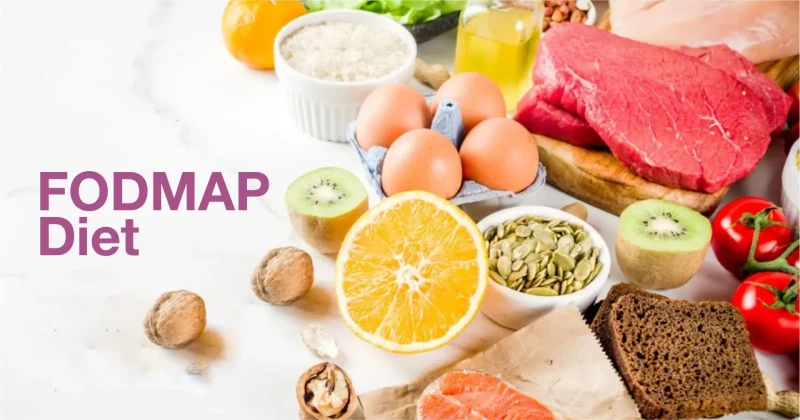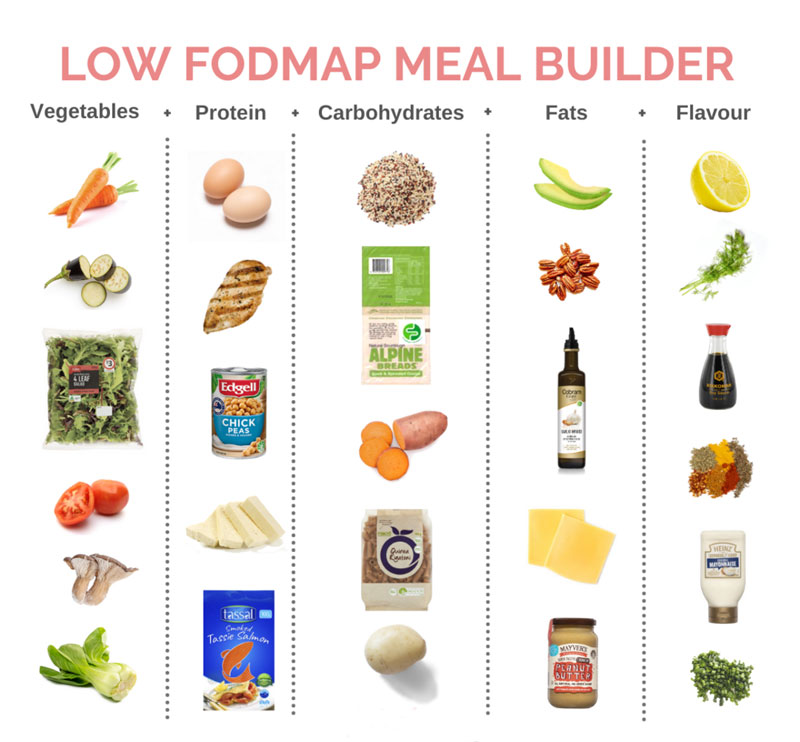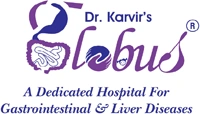FODMAP Diet
What is FODMAP diet?
The FODMAP (Fermentable Oligosaccharides, Disaccharides, Monosaccharides, and Polyols) diet is a way of eating that helps people with certain digestive problems, like irritable bowel syndrome (IBS), manage their symptoms. It involves avoiding certain types of carbohydrates and sugar alcohols (Sugar Alcohols are also known as polyols, which are the ingredients used as sweeteners and bulking agent) called FODMAPs, which can cause bloating, gas, and stomach pain.

Let's break down what each component of FODMAP represents:
- Fermentable: FODMAPs are carbohydrates that are easily fermented by bacteria in the gut. When these carbohydrates are not fully absorbed in the small intestine, they move into the large intestine where bacteria break them down, producing gas as a byproduct.
- Oligosaccharides: This refers to certain types of carbohydrates composed of a small number of sugar units linked together. Examples include fructans, which are found in foods like wheat, onions, and garlic, and galacto-oligosaccharides, which are present in legumes (beans, lentils).
- Disaccharides: Disaccharides are carbohydrates made up of two sugar units. Lactose, the sugar found in milk and dairy products, is a common disaccharide.
- Monosaccharides: Monosaccharides are single sugar units. In the context of FODMAPs, excess fructose is a monosaccharide that can be found in some fruits, honey, and high-fructose corn syrup.
- Polyols: Polyols are sugar alcohols that occur naturally in certain fruits and vegetables, as well as in artificial sweeteners. Examples include sorbitol, mannitol, and xylitol.
FODMAPs are found in many foods, including wheat, onions, garlic, beans, certain fruits, dairy products, and some sweeteners. During the diet, you start by cutting out high-FODMAP foods for a few weeks to see if your symptoms improve. Then, you gradually reintroduce specific FODMAP groups to identify which ones trigger your symptoms.
Why are FODMAPs difficult to digest?
FODMAPs can be difficult to digest because our bodies don't have the necessary enzymes to break them down completely in the small intestine. This means that when we eat foods high in FODMAPs, they can pass into the large intestine without being fully digested.
Once in the large intestine, these undigested FODMAPs can be fermented by bacteria that naturally reside there. This fermentation process produces gas as a byproduct, leading to symptoms like bloating, gas, and discomfort in some individuals. So, the difficulty in digesting FODMAPs lies in our body's limited ability to break them down completely in the small intestine, allowing them to reach the large intestine where fermentation occurs, causing digestive symptoms for some people.
What are common symptoms of FODMAP intolerance?
Common symptoms of FODMAP intolerance can vary from person to person, but they often involve gastrointestinal discomfort. Some common symptoms include:
- Bloating: Feeling full or swollen in the abdominal area.
- Gas: Excessive flatulence or passing of gas.
- Abdominal pain: Discomfort or cramping in the stomach or lower abdominal region.
- Diarrhea or constipation: Changes in bowel movements, ranging from loose stools to difficulty passing stools.
- Nausea: Feeling queasy or an urge to vomit.
- General digestive discomfort: Overall discomfort or unease in the digestive system.
Are there different variations or approaches to the FODMAP diet?
There is typically one main type of diet referred to as the "low-FODMAP diet." This diet involves initially eliminating high-FODMAP foods from the diet and then systematically reintroducing them to identify specific triggers.
However, it's worth mentioning that within the low-FODMAP diet, FODMAPs are categorized into different groups based on their chemical composition. These groups help guide the elimination and reintroduction process.
What can I eat on the low-FODMAP diet?
A low-FODMAP diet consists of foods that are low in fermentable carbohydrates and sugar alcohols.
Here are some examples of foods that are generally considered low in FODMAPs:
- Proteins: Meat, poultry, fish, tofu, eggs.
- Grains: Rice, gluten-free oats, quinoa, corn.
- Fruits: Banana, blueberries, strawberries, oranges, grapes.
- Vegetables: Carrots, cucumbers, lettuce, zucchini, bell peppers.
- Lactose-free dairy: Lactose-free milk, lactose-free yogurt, hard cheeses.
- Fats and oils: Olive oil, coconut oil, butter.

Is the low-FODMAP diet a long-term solution?
The low-FODMAP diet is not intended to be a long-term or permanent solution. It is typically used as a short-term intervention to identify and manage trigger foods for individuals with conditions like irritable bowel syndrome (IBS) or other FODMAP-related symptoms.
The primary goal of the low-FODMAP diet is to reduce symptoms by eliminating high-FODMAP foods for a specific period, usually around 2 to 6 weeks. After this elimination phase, foods are systematically reintroduced to identify specific triggers for each individual.
The goal is to create a balanced and varied eating pattern that avoids unnecessary dietary restrictions and maintains good nutritional health.
Are FODMAPs bad for everyone?
No, FODMAPs are not bad for everyone. FODMAPs are types of carbohydrates and sugar alcohols that are naturally present in many foods. They are a normal part of our diet and are generally well-tolerated by most people.
However, for some individuals, particularly those with digestive conditions like irritable bowel syndrome (IBS), FODMAPs can cause uncomfortable digestive symptoms such as bloating, gas, abdominal pain, and changes in bowel movements. In these cases, following a low-FODMAP diet, at least temporarily, can help manage and reduce these symptoms.
It's important to note that the FODMAP diet is not meant to be a long-term or permanent way of eating. Once trigger foods are identified, individuals can often reintroduce a variety of FODMAPs back into their diet, as tolerated, without experiencing symptoms.
If you have any IBS related concerns, get in touch with us today. Call +91 98331 06104, 98331 87118 to schedule an appointment and take a step towards better digestive health. Our compassionate team is ready to assist you on your journey to optimal well-being. Trust Globus Gastroenterology Hospital for all your gastroenterology needs.
Your digestive health is our priority!"
Others Condition:
Bloating | Cancers of Stomach, Intestine & Liver | Constipation | Hirshsprung’s Disease | Gallstone | Dysphagia | Inflammatory Bowel Disease | Pancreatitis | SIBO | Barrett’s Esophagus | Blood in Stools / Vomitus | Celiac Disease | Diarrhea | Fatty Liver | Gerd | Irritable Bowel Syndrome | Piles



